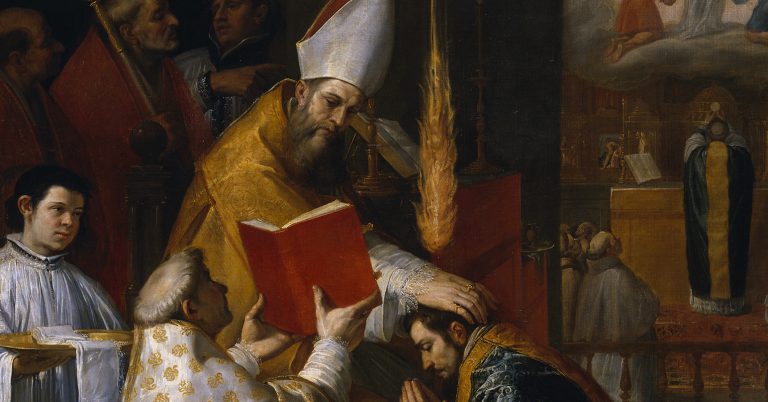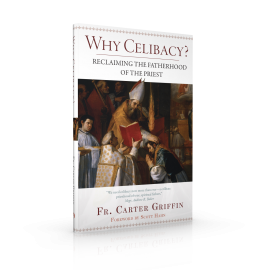“Everyone who has left houses or brothers or sisters or father or mother or children or lands, for my name’s sake, will receive a hundredfold, and receive eternal life.” —Matthew 19:29

The question of the Catholic celibate priesthood has become more and more common, first following fear of a shortage of priests and then amid scandals within the priesthood. Allowing priests to marry looks to some as the easiest and most logical fix to what they perceive as broken. But first we should ask why celibacy is the norm, for priests in the Roman rite and for bishops in the Eastern church. We need to understand why celibacy is the longstanding tradition of the Church.
Why are Priests Celibate?
Celibacy makes sense: single men are freer to serve their parish, have fewer reasons for holding back in ministry, and avoid favoritism.
But while all these are secondary benefits to a celibate priesthood, none of them are the Church’s true reason for upholding her tradition. Rather, in what appears to be a contradiction of terms, the Catholic priest is celibate in order to be freed for fatherhood.
“Celibate priests possess a unique capacity to reveal the Father and the Father’s love.” —Fr. Carter Griffin, Why Celibacy?: Reclaiming the Fatherhood of the Priest
Priests renounce natural fatherhood in order to more perfectly image the supernatural fatherhood of God. While God’s fatherhood looks different than the natural fatherhood we’re familiar with, his role as Father is mysteriously more true and complete than fathers who generate natural life. Every other image of fatherhood is a faint echo of the supernatural fatherhood of God.
Priests, who still fall short of God’s example, more closely mirror this complete role of father. Like God the Father, they give of themselves entirely for the sake of a supernatural fatherhood. This is fittingly reflected in the total self-gift of celibacy.
“Celibacy, lived well, can offer a great deal of support to a priest who wishes to exercise generous, self-giving love. A celibate heart is open to all, without preference.” —Fr. Carter Griffin, Why Celibacy?
For a more in-depth exploration, read Fr. Carter Griffin’s article “Why We Call Priests ‘Father.’”

But Have Priests Always Been Celibate?
If this is true, why aren’t all priests required to be celibate? And weren’t the first priests married?
Before Christ, sterility was seen as a curse. In the Old Testament, the faith was passed on from generation to generation within the chosen people. But with Christ and the New Testament, faithful sterility was transformed into faithful virginity. While natural generation was still a blessing, in the New Covenant the faithful were now multiplied through spiritual generation.
While the Church’s understanding of the celibate priesthood has developed overtime, from the beginning, ministerial celibacy was seen as a chosen good.
What about those passages in the letters of St. Paul that seem to suggest that priests should have one wife?
Fr. Carter Griffin explains that St. Paul’s injunctions to Timothy and Titus that a bishop should be a “husband of one wife” (1 Tim 3:2; Titus 1:6) don’t rule out the early adoption of celibate priesthood. St. Paul also urged widows to be the “wife of one husband” (1 Tim 5:9). Paul’s statements about bishops could also, and likely do, refer to their renunciation of marriage if they become widowed.
And what about the Byzantine Catholic rite? Aren’t priests allowed to marry?
While priests are allowed to marry in the Eastern tradition, bishops remain celibate. Because of different needs and customs, the Church in her wisdom allows freedom in the small “t” traditions of the East and West—but while the traditions vary, the valued model of celibate, supernatural fatherhood remains universal.
Read Fr. Griffin’s overview of the Church’s longstanding tradition to learn more.

Should the Tradition Change?
Still, if celibacy is not an absolutely necessary prerequisite to the priesthood, some question why celibacy can’t at least be optional. Again, the fear that we are facing a shortage of vocations and that the priesthood is in crisis leads some to question whether it is time to change the tradition.
But in his book Why Celibacy?, Fr. Carter Griffin warns that altering the tradition of priestly celibacy would have unintended consequences. He also argues that while there is a crisis in the priesthood, it is not one caused by celibacy, but by celibacy lived badly. The problem is unfaithfulness to the vow, not the vow itself.
In fact, he argues that a recommitment to priestly celibacy can renew the priesthood like no other option.
“Taken seriously, celibate priestly fatherhood is a path to genuine clerical renewal and reform today, ensuring that the priesthood ever more clearly radiates the humble, joyful vocation of service exemplified in the life of Jesus the High Priest.” —Fr. Carter Griffin, Why Celibacy?
Many are asking whether there is a path forward for the priesthood and what that path might be. A recommitment to the rich gift of priestly celibacy entrusted to the Church is urgently needed as we work toward meaningful renewal.
Read more in Fr. Griffin’s article on optional priestly celibacy.
You Might Also Like

Priestly celibacy, some say, is an outdated relic from another age. Others see it as a lonely way of life.
But as Fr. Carter Griffin argues in Why Celibacy?: Reclaiming the Fatherhood of the Priest, the ancient practice of celibacy, when lived well, helps a priest exercise his spiritual fatherhood joyfully and fruitfully.